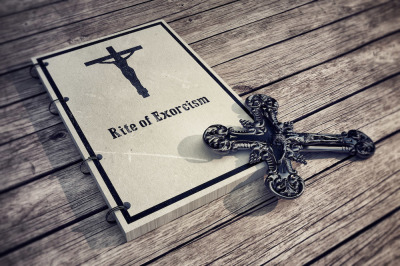Are exorcisms legitimate in our day?

What’s your gut reaction when you come across a video of a preacher casting out demons? Do you roll your eyes and dismiss it as a hoax, or do you feel a sense of hope in witnessing someone break free from the dominion of darkness?
I’ll be honest — my journey with deliverance ministries has made me more of a skeptic than a believer. Sure, I believe in the reality of demons and the stronghold they can have on individuals, leaving many desperate for liberation. But let’s face it: the prevalence of scammers in this arena is concerning.
In recent years, we’ve witnessed a surge on platforms like YouTube featuring self-proclaimed “Dragon Slayers” who have gained fame by publicly demonstrating their ministry of casting out demons during services and under the bright lights on stage.
To assist you in navigating the murky waters of deliverance ministry, I’ve compiled some key insights that will ground your understanding. Together, we’ll explore what deliverance ministry is biblically and theologically, touch on a few warning signs to be aware of when engaging with this movement, and how Christians should effectively practice it in the faith.
What is deliverance ministry?
Deliverance ministry is a practice aimed at freeing individuals from demonic control through the authority of Jesus. In His ministry, Jesus commanded and authorized His disciples to cast out evil spirits (see Luke 9:1-2; 10:17; Mark 16:17).
However, the term “deliverance” is far richer and more significant in the Old and New Testaments than what is highlighted on stage by most deliverance ministries.
Deliverance in the Old Testament
The Old Testament depicts “deliverance” as the liberation experienced by God’s people when they were “saved " (Heb., yasha) or “rescued” (Heb., natsal) from bondage or enslavement from an oppressor, or from sin itself. Another significant Hebrew term is moshaah, which encapsulates the essence of God’s ability to rescue or deliver His people from danger. These Hebrew terms underscore God’s unwavering love and His powerful might that conquers any threat or stronghold that seeks to imprison His people.
Deliverance in the New Testament
The New Testament features weighty Greek words that highlight the theology of deliverance. By looking at these key Greek terms, we can gain a clearer insight into deliverance and recognize the depth and intricacy of salvation.
- Sozo refers to being saved or rescued from sin and its consequences.
- Rhuomai emphasizes God’s role in rescuing and protecting His people from danger.
- Apallasso captures the idea of liberation, indicating that deliverance involves being freed from various forms of bondage.
- Eleutheroo reinforces the promise that God will free or liberate people from spiritual, emotional, or physical captivity.
In essence, deliverance is not just about physical rescue; it encompasses God’s promise to save, protect, and guide His people, reinforcing the belief that He is essentially a God of salvation: “The Lord is my rock and my fortress and my deliverer, my God, my rock, in whom I take refuge, my shield, and the horn of my salvation, my stronghold” (Psalm 18:2).
A primary concern with deliverance ministries
Therefore, a significant concern I have regarding deliverance ministries is their tendency to focus too much on demonic activity. This narrow perspective can lead to sensationalism, where an overemphasis is placed primarily on casting out demons rather than addressing people's holistic needs.
Moreover, this approach often aligns with the prosperity doctrine, which manipulates people into believing they must contribute financially to these ministries to receive deliverance from demons or attain financial blessings. Such teachings can create an unhealthy dependency on financial gifts as a means to achieve spiritual freedom. This not only distorts the true nature of deliverance but also exploits vulnerable individuals who are searching for spiritual and emotional help.
Bringing biblical balance to deliverance ministries
Believers must understand that deliverance involves more than just facing demonic forces. They shouldn't believe naively that demons are the sole cause of their troubles and that everything will be fine if the right anointed preacher casts them out.
Deliverance ministries often focus, to a fault, on the hype surrounding Satan’s attacks while neglecting to equip their audiences — if some are theologically equipped to do so.
Yes, we should believe what Peter said about Jesus — that He went about doing good and healing all who were “oppressed by the devil” (Acts 10:38). This serves as a strong reminder for all of us about the need for ministry in God’s power. However, that is not all that Jesus did, nor is it the primary command He gave to the Church.
True deliverance encompasses a comprehensive understanding of God’s salvific grace, healing, and protection — not just the casting out of demons.
In Matthew 28:19-20, we receive what is known as the Great Commission: the directive to preach the Gospel, make disciples, and cast out demons. All three elements are vital for us as followers of Christ, and we must not downplay one command over the others.
Sharing the Gospel with those in need of knowing Jesus and helping Christians grow in their faith constitutes the majority of what we find in the New Testament. In Hebrews 5:14, the writer emphasizes the importance for Christians to be trained so they can mature and “recognize the difference between right and wrong.” In 2 Peter 1:3-11, Peter encourages dispersed Christians to “make every effort to add to their faith” (3:5) so that they are not “ineffective or unfruitful in the knowledge of our Lord Jesus Christ” (3:8).
If we genuinely want to see people delivered, we must preach Jesus to the world (Mark 16:15), teach them to be rooted in the Word of God (Psalm 1; Colossians 2:6-7), and assist them in growing their faith (1 Peter 2:2) as they develop their spiritual gifts to edify the body of Christ (1 Corinthians 12:12-31). By doing this, Christians will be better equipped to resist the devil (James 4:7) and avoid falling into his schemes (2 Corinthians 2:11) because they are drawing closer to God (James 4:8) and are outfitted with His armor (Ephesians 6:10-19).
So, the next time you feel drawn to a deliverance ministry, be sure to evaluate whether it is anchored in a biblical balance rather than offering a one-dimensional teaching that does not fully capture the essence of deliverance as presented in infallible Scripture.
Jason Jimenez is the founder and president of Stand Strong Ministries and is a respected Christian-worldview speaker, and faculty member at Summit Ministries. He is the best-selling author of Hijacking Jesus: How Progressive Christians Are Remaking Him and Taking Over the Church, Challenging Conversations: A Practical Guide to Discuss Controversial Topics in the Church, and Parenting Gen Z: Guiding Your Child through a Hostile Culture.




























